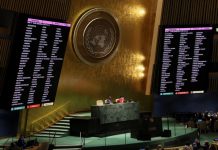President-elect Ebrahim Raisi said on Monday that the United States violated the 2015 nuclear deal with Iran and the European Union failed to fulfil its commitments.
Addressing his first news conference in Tehran since his victory in Friday’s election, Raisi said the US and the EU should fulfil their pledges under the deal.
He said he wouldn’t meet with President Joe Biden nor negotiate over Tehran’s ballistic missile programme and its support of regional militias.
Judiciary chief Ebrahim Raisi also described himself as a “defender of human rights” when asked about his involvement in the 1988 mass execution of some 5,000 people.
“The US is obliged to lift all oppressive sanctions against Iran,” he said.
Raisi’s election puts hard-liners firmly in control across the government as negotiations in Vienna continue to try to save a tattered deal meant to limit Iran’s nuclear programme, at a time when Tehran is enriching uranium at 60 percent, its highest levels ever, though still short of weapons-grade levels. Representatives of the world powers party to the deal returned to their capitals for consultations following the latest round of negotiations on Sunday.
MIDDLE EAST REACTION: The election of a hardline Iranian president has so far been met with silence from Saudi Arabia, but commentators in state-controlled Saudi newspapers forecast little change in Iran’s foreign policy as security hawks tighten their grip on power.
Most Gulf states, including the United Arab Emirates which is also at odds with Iran, offered congratulations.
“After Ebrahim Raisi’s win we do not expect any important changes in foreign policy since it falls under the supreme leader, and the (nuclear) deal being negotiated by (incumbent President Hassan) Rouhani’s team in Vienna will go through,” wrote Abdulrahman Rashed in Saudi-owned Asharq al-Awsat daily.
Riyadh and its allies are eyeing the talks between global powers and Iran to revive a 2015 nuclear pact that Washington quit in 2018 and which Gulf states opposed for not addressing Tehran’s missile programme and support for regional proxies.
Analysts said progress in Vienna would determine momentum in direct talks between Riyadh and Tehran launched in April to contain tensions that have festered over the Yemen war and which grew following a 2019 attack on Saudi oil plants.
“Reconciliation with Iran is possible but within a pragmatic political framework…,” said Ali al-Kheshaiban in an op-ed in Al Riyadh newspaper. “The language of moderation and equivalence is the only political language capable of curbing Iran.”
Crown Prince Mohammed bin Salman in April said Riyadh wanted good ties with Tehran, adopting a more conciliatory tone as he tries to balance long-held animosity with economic considerations and bridge differences with Washington over how to tackle Tehran’s regional behaviour.
President Joe Biden, who has demanded Iran rein in its missile programme and end support for proxies, withdrew support for a military campaign led by Riyadh in Yemen against the Iran-aligned Houthis, who continue cross-border attacks on the kingdom.
Saudi commentator Khaled Suleiman, writing in Okaz daily, said Washington was “turning its cheek” to Iran and should avoid making “free concessions” that embolden Tehran.









